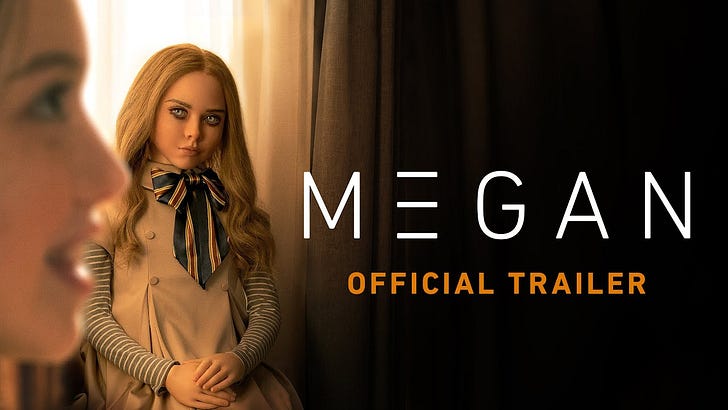If you’re looking for evidence that there is some justice in the world, take heart in the fact that M3GAN is a bona fide hit, both with critics and the cold-cash calculus of the box office.
It would have been easy for critics to sour the public appetite for M3GAN. One can imagine lazy dismissals of the film as a Chucky knock-off that shifts the source of the horror from magic to technology (as Lars Klevberg’s sadly under-appreciated 2019 remake of Child’s Play did). When it comes to horror films, critics often look for any reason to be dismissive and “we’ve seen this before” is an old war horse for professional and amateur critics alike. And sure, we have seen this kind of thing before. M3GAN shares deep roots in a genre horror tracing back to Frankenstein as well as science fiction in the 2001: A Space Odyssey tradition. But what can I say? It totally works.
M3GAN absolutely deserves its accolades. The movie works on every level. Its performances all shine, right along with the script, direction, and special effects. And the film knows exactly what it is and unapologetically owns it, conducting all its business with disciplined precision in 100 excellent minutes.
I don’t really need to describe the plot of the film if you simply watch the trailer here:
That should tell you all you need to know about what to expect. Let me just add that the film is not only entertaining, it is also smart.
Here, I just want to emphasize one aspect of the film that makes it so sharp; it provides an expert diagnosis of a major crisis in our world. Yes it’s a cautionary tale about AI, but it’s far more than that.
Horror, more than most genres, offers a direct line to the anxieties of the culture that produces them. Sometimes, those anxieties reveal a society’s bigotries (think of the anti-Semitism encoded in Murnau’s Nosferatu). Sometimes they speak to other aspects of a society’s subconscious (the “big bug” movies of the 1950s clearly have some connection to the development of atomic power, for example).
M3GAN draws its horror from an era of accelerating technological advancement. Many people will locate all the anxiety in AI, which is only natural since it’s such a hot topic in The Discourse now (the excitement and anxiety about ChatGPT is a locus of this conversation right now). And it’s entirely correct to see the movie as a manifestation of fears about AI (in the vein of Alex Garland’s Ex Machina). The way in which the film leverages the doll’s transgression of the Uncanny Valley, and its effect on people, is brilliant for instance.
However, so much of the film’s subtext transcends the topic of artificial intelligence that I think it’s worth considering other possibilities as well. Take, for instance Cady’s bad behavior under the influence of a tablet in the film’s opening scene. No, the scope of the movie’s critique extends beyond AI, into the expansive web of technologies we are caught up in.
M3GAN, the robot, can be thought of as a kind of embodiment of algorithmic social media in general. “Her” purpose, after all, is to provide a social life for the lonely, recently-orphaned Cady (Violet McGraw). Not only that, her purpose is to provide a kind of community for the grieving girl. The rhetoric that M3GAN’s creator, Gemma (Allison Williams), uses to describe her goals for bringing the doll into her niece’s life, mirror the kind of rhetoric that panicked Twitter users employed when lamenting the future of their platform under Elon Musk’s leadership. Both the social media platform and M3GAN provide accepting, authentic community for their users, according to their techno-Utopian advocates.
That the doll algorithmically adapts to its primary user is yet another point in which M3GAN is a kind of living metaphor for social media. Her programming allows her to miraculously connect with Cady as it gathers more and more data about her. There are moments in which this is inspiring (such as when M3GAN comforts Cady in a dark moment of mourning the loss of her parents).
But as the film progresses, the doll’s influence on Cady ceases to be inspiring and becomes horrifying instead. The peak of this transition occurs when Cady herself teeters on the edge of a murderous rage when separated from her friend, the android. The doll’s presence in her life has replaced, almost completely, all other human connections.
How many of us, regular users of social media, have had our moods negatively altered by what the algorithm has learned about us? Who hasn’t thought that they might be better off without it?
After Cady’s breakdown, Gemma comes to realize the full implication of her having introduced this incredible technology into her niece’s life. When Cady tells her aunt that M3GAN helped her avoid the terrible pain of her real-life tragedy, Gemma responds by telling her that that isn’t a good thing. We need to feel this kind of pain as humans. We need to deal with it honestly. The great evil that the M3GAN technology does to Cady is to dehumanize her by depriving her of authentic pain and grieving. The doll, like our social media communities often do, provides a shortcut around the necessary work of being human.
Of course, throughout the film, the doll does other kinds of evil as well; spectacular and inventive acts of murder abound for the pleasure of horror fans like me. But M3GAN’s effectiveness as a horror film springs from its deep insight into the darker sides of the seemingly liberating and benign technology in which we are immersed, so deeply that many of us are drowning.




"seemingly liberating and benign technology" he typed as they watched. Lol. Hope to see it! Thanks!